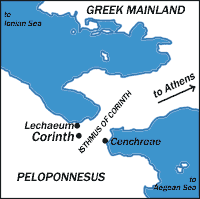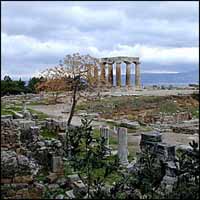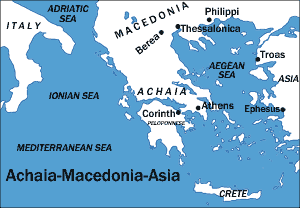
|
Old Testament
New Testament
Gospels
Acts
Paul's Letters
General Letters
Revelation
Topical Studies
Beginning the Journey (for new Christians). en Español

|
Old Testament
New Testament
Gospels
Acts
Paul's Letters
General Letters
Revelation
Topical Studies

|
Home
Bible Studies
Articles
Books
Podcasts
Search
Menu
Donate
About Us
Contact Us
FAQ
Sitemap
The City of Corinth
 The
ancient city of Corinth showed signs of human habitation as far back as the
Early Neolithic period. Its location was ideal, with an abundant water supply,
only one and a half miles south of the Isthmus of Corinth, a narrow land bridge
(only 3.9 miles or 6.3 kilometers wide), which connects the Peloponnesian
peninsula to the Greek mainland. Thus Corinth became prosperous from trade --
both the trade moving by sea east and west, but also north and south between
Greece and the Peloponnesus. The port of Cenchreae connected the city to the
Aegean Sea to the east, while the port of Lechaeum was on the Ionian Sea.[1]
The
ancient city of Corinth showed signs of human habitation as far back as the
Early Neolithic period. Its location was ideal, with an abundant water supply,
only one and a half miles south of the Isthmus of Corinth, a narrow land bridge
(only 3.9 miles or 6.3 kilometers wide), which connects the Peloponnesian
peninsula to the Greek mainland. Thus Corinth became prosperous from trade --
both the trade moving by sea east and west, but also north and south between
Greece and the Peloponnesus. The port of Cenchreae connected the city to the
Aegean Sea to the east, while the port of Lechaeum was on the Ionian Sea.[1]
In 1893, a canal was cut across the isthmus to accommodate shipping, but in the days of the early church, there was no such luxury, so all goods continuing on must be unpacked and transported by land to the opposite port. This guaranteed Corinth's wealth from tariffs as well as its prominence as an international crossroads for commerce, ideas, cultures, and religions.
Ruins of the Temple of Apollo, dating to the sixth century BC, can still be seen. Shops and monuments lining the Agora, larger than the Forum in Rome, also persist. The Temple of Asclepius, the god of healing, was built on the north edge of the city. To the south, the Acro-Corinthian fortress at the height of 1,886 feet could control all the trade routes.
 Temple of Apollo and ruins in Corinth. Source: BiblePlaces.com |
At its peak stood the Temple of Aphrodite, goddess of love and beauty, where 1,000 female prostitutes served, contributing to the city's reputation for immorality. In fact, the coined Greek word "to Corinthianize" meant to practice immorality and the phrase "Corinthian girl" designated a prostitute.
The Romans conquered and destroyed Corinth in 146 BC. In 46 BC, Julius Caesar re-founded it as a Roman colony. In 27 AD, it became the seat of government for the Roman province of Achaia.[2] As a Roman colony, its citizens were primarily Romans, perhaps freedmen from Italy, but its population also included Greeks and a considerable Jewish community. As a chief trade center, it would become a strategic base of operations for Paul, since he would meet and minister to many people travelling through, causing the gospel to spread even farther.
Founding of the Corinthian Church
 Paul first visited Corinth about 50 AD, during the last
phase of his second missionary journey, after starting churches in Macedonia --
Philippi, Thessalonica, and Berea (Acts 16-17). He came to Corinth after visiting
Athens and stayed with a couple of Jewish tentmakers, Aquila and Priscilla, who
had recently been forced to leave Rome due to an edict by Emperor Claudius (about
49 AD; Acts 18:2-3). Paul was joined in Corinth by Silas and Timothy. Under
their ministry the church grew. Paul seems to have been in danger during this
time (Acts 18:9-10).
Paul first visited Corinth about 50 AD, during the last
phase of his second missionary journey, after starting churches in Macedonia --
Philippi, Thessalonica, and Berea (Acts 16-17). He came to Corinth after visiting
Athens and stayed with a couple of Jewish tentmakers, Aquila and Priscilla, who
had recently been forced to leave Rome due to an edict by Emperor Claudius (about
49 AD; Acts 18:2-3). Paul was joined in Corinth by Silas and Timothy. Under
their ministry the church grew. Paul seems to have been in danger during this
time (Acts 18:9-10).
When the Jews appealed to the Roman proconsul Gallio (in office 51 to 52 AD) to force Paul to leave, they were rebuffed (Acts 18:11-17). Paul left Corinth probably in the spring of 52 AD, giving him two years there. After leaving Corinth, Paul stopped at Ephesus and then returned to Antioch. From there he went to Jerusalem (Acts 20:18-22).
Situation at the Time of the Letter
The congregation in Corinth developed into a large church made up of house church congregations scattered across the city. We read:
"Many of the Corinthians who heard Paul became believers and were baptized. One night the Lord said to Paul in a vision, 'Do not be afraid, but speak and do not be silent; for I am with you, and no one will lay a hand on you to harm you, for there are many in this city who are my people.'" (Acts 18:8-10)
Because of the types of problems Paul writes to the church about, it appears that they were predominately Gentile, made up of a broad mix of social levels. In the intervening years, Paul was in the midst of a very successful mission in Ephesus that reached people all over the province of Asia Minor.
But now the church was troubled. It was at odds with its founding apostle about a number of issues that threatened its spiritual life. And, ironically, the central issue was what it meant to be "spiritual" (pneumatikos).[3] Clustered around this issue were a number of related issues. Paul had attempted to correct some of them in an earlier letter (which we do not have), but he has heard from "Chloe's people" (1:11) and by letter (7:1) of a number of continuing problems.
- Competing allegiances to various leaders -- Apollos, Paul, and Peter -- that caused disunity and divisions (1:10-17; 3:1-23; 4:1-7).
- A pride in a Hellenistic understanding of philosophy and rhetoric, rather than in the simple gospel (1:18-2:16; 3:18-32).
- A rejection of Paul's apostolic authority over them (4:8-21).
- Pride in their tolerant attitude towards sexual immorality (5:1-13).
- Rejection of the church's authority to settle disputes, rather taking them to public courts (6:1-8).
- Immorality with prostitutes (6:9-20; 10:1-13).
- Rejection of marriage and celibacy (7:1-40).
- Idolatry and eating of food sacrificed to idols (8:1-13; 10:14-11:1).
- Offence at Paul refusing sponsorship but rather making the gospel free of charge (9:1-27).
- Rebellion in hair styles and coverings (11:2-16).
- Casual disregard for the proper receiving of the Lord's Supper (11:17-34).
- Exaltation of tongues over other important spiritual gifts (such as prophecy), misunderstanding the nature of the church as a body (12-14).
- Disorder in church meetings (14:26-40).
- Disbelief in the resurrection of the dead (15:1-58).
Tone of the Letter
1 Corinthians is the strongest exhortation of any of the Pauline letters that have survived, though it is not the first he has written them. A previous brief visit turned out to be a disaster. (See Appendix 3 for a "Tentative Chronology of Paul and the Corinthians".) So for most of our letter Paul is engaged in correction, chiding, shaming, explaining, defending, exhorting, arguing, and pleading. The situation is desperate and Paul must do whatever he can to help the church turn a corner to congregational health.
Groups within the Church at Corinth
There seems to be a variety of kinds of people within the church at Corinth.
- Rich and poor are visible when Paul corrects them concerning their observance of the Lord's Supper (11:18-22).
- Carnal and the super-spiritual. On the one hand Paul corrects people who are accustomed to going to prostitutes (chapter 6) and on the other hand he corrects people who see sex in marriage as somehow below their exalted spiritual state (chapter 7).
- Pagans and Jews. Though the church began with people from the synagogue -- both Jews and uncircumcised worshippers who attended the services (Acts 18:4-8) -- most of the growth in the congregation after that seems to have come from the pagan population (12:2).
- Uneducated and sophisticated. While the congregation seems to be primarily people from the lower classes (1:26), some showed considerable sophistication in arguing why they should continue in their ways (chapter 6). There certainly was a group that was impressed with classical standards of philosophy and rhetoric (chapters 2-3).
- Slave and free. A number in the congregation were probably freedmen, though many were slaves (7:20-22).
Date and Place of Writing
First Corinthians was probably written from Ephesus about 55 AD and carried to Corinth by Stephanas, Paul's first convert in Achaia. Second Corinthians was probably written from Macedonia a year later.
[1] This introduction is adapted from my introduction to 2 Corinthians: Discipleship Lessons (JesusWalk, 2011)
[2] Donald H. Madvig, "Corinth," ISBE 1:772-774.
[3] Fee, 1 Corinthians, p. 10.
Copyright © 2026, Ralph F. Wilson. <pastor![]() joyfulheart.com> All rights reserved. A single copy of this article is free. Do not put this on a website. See legal, copyright, and reprint information.
joyfulheart.com> All rights reserved. A single copy of this article is free. Do not put this on a website. See legal, copyright, and reprint information.

